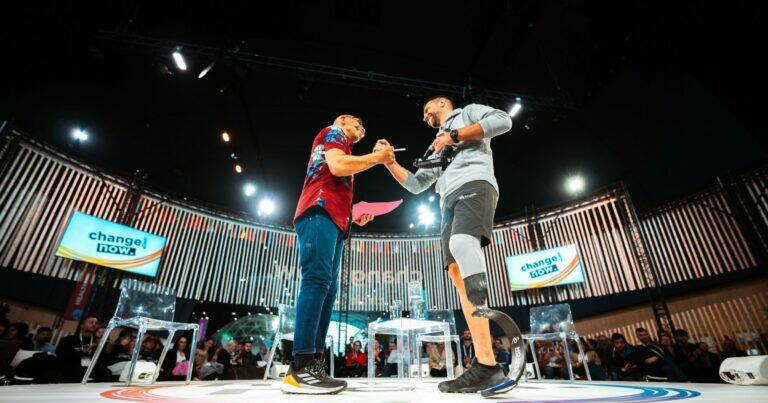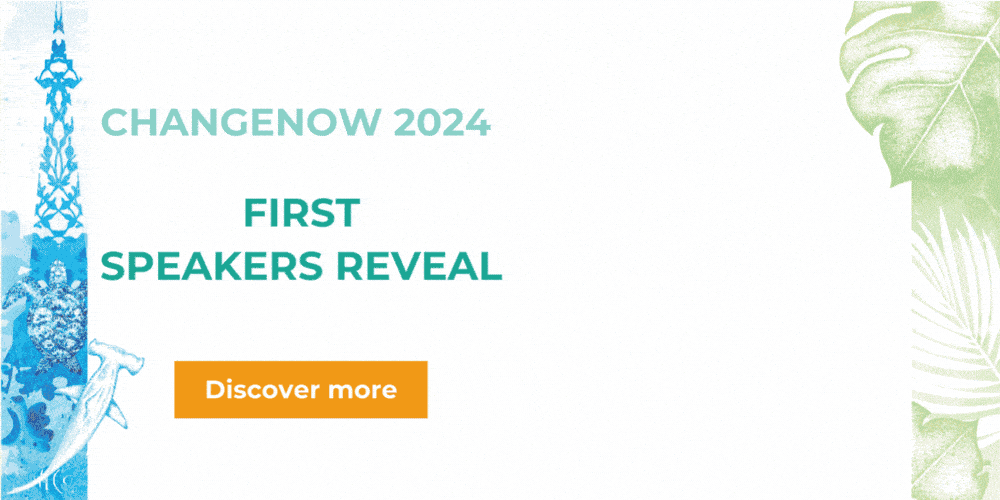2023 Sustainable commitments
We're committed to continuous improvement and taking Sustainable commitments for 2023 : from travel to production to food, waste, and resources, changenow will continue leading the next generation of sustainable event organizations.
In 2022, our objective was to better understand the carbon impact of ChangeNOW : The event footprint was measured, and ChangeNOW was EEE eco-event certified by REEVE. With these tools and experience, we start 2023 with a clear view of levers that are making ChangeNOW one of the most sustainable events. That also includes areas for improvement.
Committed to continuous improvement, we’re taking sustainable commitments for 2023.
“We have the opportunity to lead the change and push the boundaries in creating eco-responsible events. In 2023 we are challenging ourselves to think bigger, bolder, and more sustainably. Together, we can create a new generation of events that are eco-responsible, committed, and engaging.” Rose-May Lucotte, COO of ChangeNOW
5 Pillars to ChangeNOW's Sustainable Commitments for 2023
1. Travel : Partnering with railway companies for eco-friendly travel options.
We are dedicated to reducing the environmental impact of transportation by tracking and lowering the carbon footprint of travel for attendees and staff. To achieve this goal, we are actively seeking partnerships with railway companies to offer our participants more sustainable and cost-effective travel options.
By partnering with these companies, we hope to make it easier for attendees to choose environmentally-friendly modes of transportation and contribute to a more sustainable event overall. In addition, we will be working to gain a deeper understanding of the routes and modes of transportation used by our attendees to make informed decisions about reducing our carbon footprint.
2. Food : Implementing a stronger charter for sustainable food.
Ensuring our food offerings are sustainable is crucial to our events. This year, we’ve decided to revamp our charter to make it more demanding and easier to understand. We’re putting in the effort to ensure it’s better implemented and more effective.
We’ve teamed up with organizations that can help us measure the environmental impact of our dishes and redistribute food waste. This way, we can ensure that our restaurants constantly improve their sustainability practices. We’ll also calculate and limit each menu’s carbon footprint, and to really drive the sustainability message home; we’ll be offering some special training for stakeholders, like zero waste training for restaurateurs.
3. Waste : Reducing waste with a deposit system.
To minimize waste related to attendees, we are considering implementing a deposit system, particularly for food items. This system would encourage the reuse of items and reduce our reliance on compostable disposable tableware. Additionally, we will collaborate with other events to reuse our scenography and other materials, further reducing our waste. By focusing on these efforts, we hope to significantly reduce waste and create a more sustainable event experience for all.
4. Resources : Using fewer resources.
To conserve resources and minimize our environmental impact, we prioritize using fewer resources and cleaner options, particularly for signage. This includes using energy and water efficiently, recycling and reusing materials whenever possible, and choosing more environmentally friendly products. We want to create a more sustainable event for all attendees by making these conscious choices.
5. Production : Collaborating with like-minded organizations for a positive environmental impact.
We are committed to collaborating with providers and partners who share our values and are taking concrete steps to reduce their environmental impact. We want to create a more positive and lasting environmental impact by partnering with like-minded organizations. This includes working with local and labeled providers with certifications such as B-corp, ISO 20121, and Ecotable. We also have charters and contractual commitments with our exhibitors to ensure they are aligned with our sustainability goals.
We are constantly striving to do better as a pioneer in sustainable events and are committed to continuous improvement. We recognize that there is always more we can do to reduce our environmental impact and create a more sustainable experience for our attendees. That’s why we are always seeking new ways to minimize waste, conserve resources, and promote eco-friendly practices. Additionally, we value the feedback of our attendees and are committed to listening to their suggestions and concerns. By considering their input, we hope to create an event that is not only sustainable but also one that meets the needs and expectations of our attendees. We are dedicated to being leaders in sustainability and hope to inspire others to join us in our efforts to create a better future for all.
Furthering our Commitment to the Environment : how ChangeNOW is optimizing resources while minimizing waste
The circular economy is a model of economic activity that aims to keep resources in use for as long as possible by optimizing resource efficiency and minimizing waste. This is in contrast to the traditional linear economy, which follows a “take-make-use-dispose” model, in which resources are extracted, processed, consumed, and discarded.
When producing any ChangeNOW event, we apply the principles of the circular economy, which can be summarized as the “6R’s” :
Reduce : More precisely, to reduce the consumption of resources. This can be achieved by designing events that minimize the use of materials, energy, and other resources and by choosing suppliers with a proven sustainability track record.
- Served low-carbon meals
- Limited amount of paper waste
- Reduced petroleum-derived materials
- 0 goodies, kakemonos, plastic bottles
Reuse : We reuse materials whenever possible. This can involve sourcing second-hand materials, renting equipment, or finding creative ways to repurpose items that would otherwise be discarded.
- Reused scenography and signage elements from the previous year.
- Rented all furniture instead of buying new
- Found a second life for the scenography equipment by repurposing it or donating it to be used again.
Recycle : What we cannot reuse, we recycle. This can involve working with recycling companies or implementing in-house recycling systems to ensure that materials are appropriately processed and returned to the production cycle.
- Innovative sorting system.
- Composting of food waste
- Recycling of cigarette butts
- awareness-raising and education activities on sorting.
Refuse : Not accepting or using certain products or materials in the first place to minimize resource consumption and waste. This can involve choosing products and materials that are more sustainable or opting not to use disposable items.
- No plastic bottles
- no plastic badges
- no single-use carpet
- no high-emission meals
Recover : We recover value from waste materials. This can involve finding new uses for materials that would otherwise be discarded or extracting valuable resources from waste streams.
- Transforming outdated signage elements
- Redistributing leftover food.
Redesign : The final principle is redesigning products, processes, and systems to eliminate waste and promote resource efficiency. This can involve redesigning products to be more durable, reusable, or recyclable or finding more efficient ways to produce and distribute goods and services.
- Innovative alternatives: mineral paper or recycled paper badges
- Furniture made from recycled plastic waste
- deposit packaging
- Water fountains




